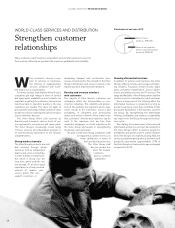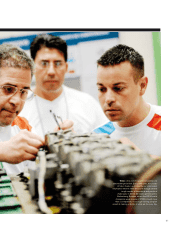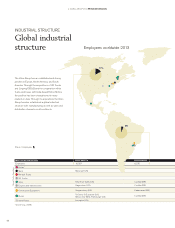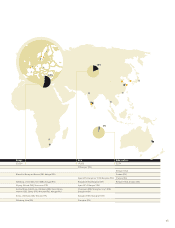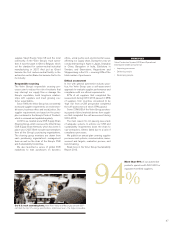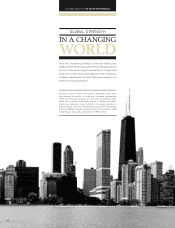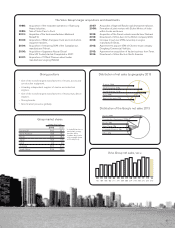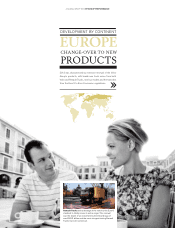Volvo 2013 Annual Report Download - page 46
Download and view the complete annual report
Please find page 46 of the 2013 Volvo annual report below. You can navigate through the pages in the report by either clicking on the pages listed below, or by using the keyword search tool below to find specific information within the annual report.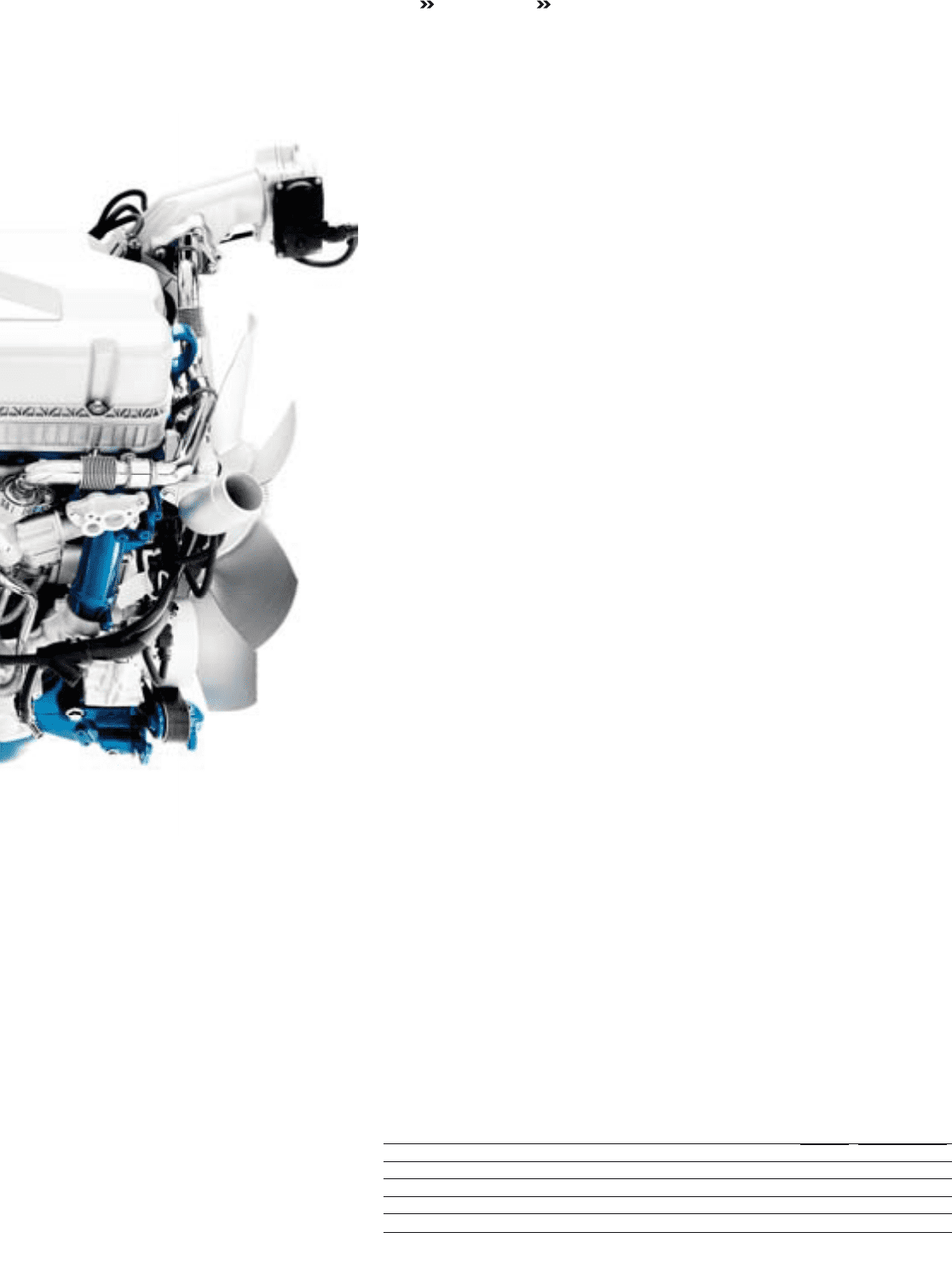
A GLOBAL GROUP 2013 BUSINESS MODEL A HIGH-PERFORMING ORGANIZATION
Developing talents
Every manager is responsible for assessing and
developing talent in the organization. The Leader-
ship Pipeline provides the Group with a structured
approach to developing and preparing present
leaders as well as potential leaders for future roles.
The Leadership Pipeline has been set up
jointly with research institutes and is based on
global research. It is also designed to support
the Volvo Group’s culture and values as well as
the strategic objectives.
Diversity enhances innovation
To create the dynamics required to succeed at
a global level the Volvo Group needs to recruit
and retain a broad spectrum of employees with
different backgrounds, experience and perspec-
tives. In the Volvo Group, diversity is considered
to be a catalyst for innovation and a source of
competitiveness and profi tability. By expanding
the knowledge base, skills and understanding,
the Group becomes more responsive to cus-
tomer needs and it strengthens the Group’s
market position. Diversity and inclusion have
long been prioritized within Volvo.
be reduced in Group Trucks Operations, Group
Trucks Technology, Group Trucks Sales and
Marketing EMEA, IS/IT, Finance and Human
Resources. This is a consequence of the trans-
formation the Group is undergoing. With a new
organization and new ways of working in place,
the Group will be able to utilize its resources
more cost-effi ciently. A majority of the personnel
reductions will be implemented during 2014.
Responsibility when plants are closed
The Volvo Group strives to take responsibility
also in times of restructuring. When the Euro-
pean production of complete buses was con-
centrated to the main plant in Wroclaw, Poland,
in mid-2013, operations in the plant in Säffl e,
Sweden were discontinued.
After the decision, Volvo Buses was active in
creating new jobs and providing support for the
establishment of companies with high expan-
sion potential in the former bus plant. Agreements
regarding establishment of operations in the
Säffl e plant were signed with contract manu -
facturer Hanza and with Cellcomb, which devel-
ops and manufactures environmentally-friendly
disposable laminate products. This process was
implemented in close collaboration between
Volvo Buses and Säffl e municipality. Of the 328
employees affected when Volvo Buses discon-
tinued its operations in the Säffl e production
plant, by the end of the year 248 had got new
jobs or had been offered occupational pension.
– It is clear that our former employees are
attractive in the labor market. The competency
survey we conducted combined with the oppor-
tunity for competency development, also con-
tributed to increasing the potential for employ-
ees to secure new employment, says Håkan
Karlsson, Head of Business Areas at Volvo
Group, which includes Volvo Buses.
Training in Code of Conduct
A Group-wide training program was launched in
November 2012 to support the implementation
of the updated Code of Conduct. This training
helps our employees and managers to refl ect on
their own attitudes and behavior in different sit-
uations. Since the launch of the updated Code
of Conduct 23,513 white-collar employees (out
of around 50,000) have participated in the web-
based training.
All employees within the Volvo Group are
expected and encouraged to report suspected
violations of the Code of Conduct to their direct
superiors or managers of their superiors. To sup-
port this, a Whistleblower procedure is available.
Read more in the Volvo Group’s Sustainability
Report 2013.
Key fi gures 2013 2012
Number of permanent employees at year-end 95,533 96,137
Number of temporary employees and consultants 14,794 13,452
Share of women, % 17 17
Share of women, Board Members, % 17 14
Share of women, Presidents and other senior executives, % 19 20
VGAS 2013 – closing the gap to
high- performers
Overall results for the Volvo Group Attitude
Survey (VGAS) 2013 indicate high levels of
employee engagement across the Volvo Group.
– It is very positive that employee engage-
ment remains high during the organizational
change, says Kerstin Renard, Executive Vice
President, Corporate Human Resources.
The Employee Engagement Index (EEI) for
Volvo Group remains stable at 76% favorable.
Meanwhile the external benchmark against
high-performing companies has moved up to
77%. The Performance Excellence Index (PEI),
capturing if we have the right structures, pro-
cesses and collaboration in place, increased to
75% favorable (from 74% in 2012).
– We are closing the gap to the high perform-
ing companies. We need to improve our ability to
correct customer problems quickly, but 73% of
all employees now report that their work group or
team regularly reviews their performance. That is
6 percentage points above the global high-per-
forming norm, explains Kerstin Renard.
The top priorities for employee engagement
relate to Leadership & Vision, Diversity & Inclu-
sion, and Communication.
– It is critical that senior leaders clearly
explain and communicate the reasons for mak-
ing a decision. Consistent communication by
leaders will reinforce employee confi dence and
trust in our new direction, says Kerstin Renard.
The new leadership effectiveness index has
improved by 2 percentage points compared to
the results last year. With a 71% favorable
result for leadership effectiveness, Volvo Group
is trailing 3 percentage points below the exter-
nal high-performing norm. The effectiveness
index captures a broader range of leadership
behaviors that are critical for building employee
engagement and performance.
– All our leaders need to demonstrate that
we value diversity, says Kerstin Renard. This is
one area where we still have signifi cant gaps to
high-performing norms.
Staff and support function rationalization
In the autumn of 2013 a Group-wide effi ciency
program was announced. It is based on activi-
ties related to the implementation of the Group’s
strategies and which will be implemented in
2014 and 2015. After detailed analysis of the
consequences of the program the estimate is
that approximately 4,400 white-collar employ-
ees and consultants will be affected by person-
nel reductions, including previously announced
2,000 within staff and group support functions.
White-collar employees worldwide will primarily
42








